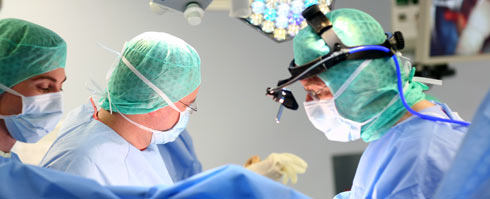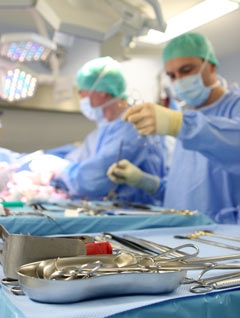Surgery
The following surgical procedures are available in the treatment of pancreatic cancer:
Distal pancreatectomy
Distal pancreatectomy involves the removal of the left-hand part of the pancreas, i.e. the part facing the spleen. The spleen itself can be preserved in this procedure; however, if the tumour is malignant, it is generally necessary to remove the spleen. The remnant of the pancreas is then sutured at the cut edge or connected to the intestines as a drainage operation.
Removal of the left part of the pancreas only very rarely leads to insufficient production of pancreatic enzymes or impairments to the glucose metabolism as diabetes mellitus.
Pancreatic head resection (Kausch/Whipple resection):
This operation, which represents the traditional version of the surgical treatment of pancreatic cancer, involves the removal of two-thirds of the stomach, the duodenum, the gall bladder and the pancreatic head, as shown in the illustrations. Only the inclusion of structures adjacent to the tumour in this radical removal makes it possible to remove important drainage routes of the tumour. Lymph nodes removed as part of the procedure can then be histologically examined by a pathologist and provide an insight into the spread of the tumour, as they are generally the first to be affected by an advanced tumour. The pancreas can then be reconnected either to the stomach or to the intestines. Both procedures are used in our department. In both cases, the suture seams are critical, because the aggressive secretion of the pancreas can attack the sutured seam of the pancreas. The bile duct is then connected to a duodenal loop, as is the stomach.
The classic version of this procedure is generally modified these days by not resecting the stomach. This modern version also preserves the sphincter at the end of the stomach and is thus often referred to as pylorus-preserving procedure or Traverso-Longmire procedure after the surgeons who first performed it.
This procedure can result in a range of problems in the postoperative course. The removal of pancreatic tissue can lead to a lack of digestive enzymes and thus an impaired absorption of nutrients from the intestines. The partial resection of the stomach can result in bacterial overgrowth of the small intestines with the consequence of impairment to the passage of food or to an impaired or accelerated passage into lower regions of the intestines (dumping syndrome). Constrictions at the suture seam of the bile duct or that of the stomach are very rare. However, in some cases, the preservation of the stomach can result in delayed gastric emptying after the operation.

Total pancreatectomy
This version of pancreas resection surgery represents the most radical form of treatment, as it involves the complete removal of the entire pancreas. However, this results in considerable problems for patients afterwards, particularly regarding the glucose metabolism, which in some cases can be severely out of control. After the operation, patients often have to struggle with a difficult adjustment of the glucose metabolism, also with a great risk of life-threatening hypoglycaemia. For that reason, total pancreatectomy is only used as a last resort, when the pancreas has to be removed either because of leakage of the suture seam or because of a very advanced tumour.
Segmental pancreas resection
In rare cases of pancreatic tumours, it is also possible to perform organ-preserving surgery. This option exists particularly in the case of endocrine, i.e. hormone-producing tumours. Potential problems associated with this organ-preserving procedure include the reconnection of the pancreas to the intestine and the associated risk of a temporary pancreatic fistula. On the whole, this procedure is much more rarely used than the Whipple procedure, the pylorus-preserving pancreatoduodenectomy or the distal pancreatectomy.
Specialized surgeons

Surgery of the pancreas is one of the most difficult procedures in visceral surgery. Surgeons in our Centre have specialized in this particular field.
